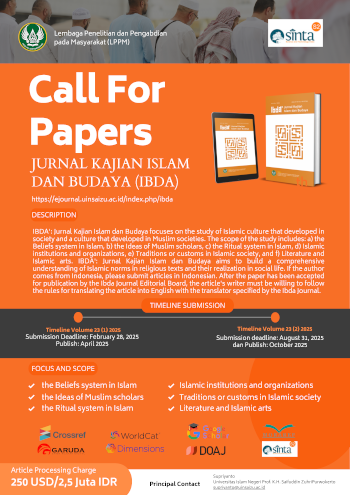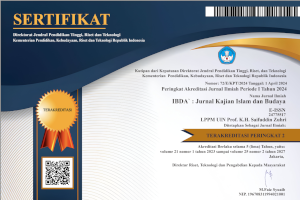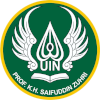Islamic Ethnoeducation On Traditional Games From The Kaili Tribe Of Palu City
DOI:
https://doi.org/10.24090/ibda.v20i2.6948Keywords:
Ethnoeducation, Traditional Children's Games, Socio-Cultural, IslamicAbstract
The traditional games of kaili children, nogarata, nomaca, and gunrece, are formed from socio-cultural processes influenced by the spirit of Islam. His paradigm of play shifted from the sacred and mystical to the educational and Islamic paradigm that positioned traditional games as a vehicle for educating and shaping morals. The purpose of this study is to find, identify, and explain the traditional game paradigm of the Kaili tribe in the context of sociocultural, educational, and Islamic (Islamic ethnoeducation). The method used in this study is a qualitative descriptive method that aims to obtain and obtain the results of phenomena in aspects of Islamic ethnoeducation in the traditional game of the Kaili Tribe. Intensive data collection is carried out with engaged observation, interviews and documentation. Data analysis is performed using ethnographic principles through domain analysis, taxonomic analysis, and component analysis. The result of his research is that the traditional games of the Kaili people, nogarata, nomaca, and gunrece, are formed and distributed in socio-cultural, educational, and Islamic dynamics. Socio-culture is a source of creation and value systems; education becomes the pragmatics of the use of traditional children's games for teaching or educational purposes; while Islam became an identity that changed the socio-cultural paradigm and became an important value system in the traditional game of the Kaili Tribe. With the Islamic paradigm, the traditional game of Kaili tribe children becomes a game carried out with the aim of distributing and internalizing Islamic values, especially in the good morals of children.Downloads
References
Achroni, K. (2012). Mengoptimalkan Tumbuh Kembang AnakMelalui Permainan Tradisional Panduan untuk Orangtua dan Guru. Buku Kita.
Al-Ghazali, S. M. (2021). Menghidupkan Ajaran Ruhani Islam. Penerbit Lentera.
Ardiansyah. (2020). “Nilai Karakter Dalam Permainan Tradisional di Suku Kaili Kota Palu Sulawesi Tengah.” Universitas Negeri Yogyakarta.
Ferdiyayan. (2016). “Islamisasi di Lembah Palu pada Abad XVII.” UIN Alauddin Makasar.
Gazali. (2016). STRUKTUR, FUNGSI, DAN NILAI NYANYIAN RAKYAT KAILI. LITERA, 15(1), 189–200.
Herawati. (2015). Identitas Kultural dan Karakteristik Lisan Orang Kaili dalam Mantra Tamabunto. K A N D A I, 11(2), 161–175. http://id.wikipedia/wiki/neurosis
Ja’far, D. dan. (2016). Falsafah Pendidikan Islami: Menguak Nilai-Nilai Pendidikan dalam Tradisi Islam. Perdana Publishing.
Kadir, S. (2019). Pola Akulturasi Islam dan Budaya Pompaura pada Masyarakat Suku Kaili. Jurnal Ilmu Kependidikan Dan Keislaman, 14(1), 27–38.
Maddini, N. & H. (2018). Sejarah Dato Karama (Abdullah Raqie) Ulama Pembawa Islam Dari Minangkabau Ke Sulawesi Tengah. IAIN Palu Press.
Marwany. (2015). “Permainan Tradisional Suku Kaili dalam Mengembangkan Aspek Kecerdasan Fisik Motorik, Bahasa, Intelektual, dan Sosioemosinal pada Anak Usia Dini.” Universitas Negeri Jakarta.
Moleong, L. J. (2017). Metodologi Penelitian Kualitatif. PT. Remaja Rosdakarya.
Muhidin, N. (2012). Narasi Orang Biasa: Profil Kampung dan Kader Wahana Visi Indonesia ADB Palu. Wahana Visi Indonesia.
Palu Pemerintah Kota. (2009). Kota di Titik Nol. Pemerintah Kota Palu.
Pangsibanne, L. K. (2017). Islam dan Budaya Lokal: Kajian Antropologi. Kaukaba Dipantara.
Saleh, S. (2013). Kearifan Lokal Masyarakat Kaili di Sulawesi Tengah. Academica Fisip Untad, 05(02), 1126–1134.
Siregar, H. dan T. R. (2008). Permainan Tradisional Indonesia. Departemen Pendidikan dan Kebudayaan.
Sreadley, J. P. (2021). Metode Etnografi. Tiara Wacana.
Stone, S. J. (2003). Playing A Kid`s Curriculum. Good Yeasr Book.
Sujiono, B. (2005). Menu Pembelajaran Anak Usia Dini. Yayasan Citra Pendidikan Indonesia.
Syahid, A. (2022). Nilai-Nilai Kearifan Budaya Lokal Kaili dalam Pembelajaran Multikultural. Prosiding Kajian Islam Dan Integrasi Ilmu Di Era Society 5.0. Palu, 1(1).
Thalib, A., & Maulinda, R. (2021). Pengembangan Model Pembelajaran Nobangan Berbasis Permainan Tradisional Suku Kaili Terhadap Nilai Keaktifan Siswa Kelas Iv Sekolah Dasar. Elementary School: Jurnal Pendidikan Dan Pembelajaran Ke-SD-An, 8(1), 199–206. https://doi.org/10.31316/esjurnal.v8i1.1103
Windari. (2021). Islam Lokal: Sejarah, Budaya, dan Masyarakat. UIN Sunan Kalijaga Yogyakarta.
Downloads
Published
How to Cite
Issue
Section
License
Copyright (c) 2022 Marwany

This work is licensed under a Creative Commons Attribution-ShareAlike 4.0 International License.
Authors who publish with this journal agree to the following terms:
- Authors retain copyright and grant the journal right of first publication with the work simultaneously licensed under a Creative Commons Attribution-ShareAlike License a that allows others to share the work with an acknowledgement of the work's authorship and initial publication in this journal.
- Authors are able to enter into separate, additional contractual arrangements for the non-exclusive distribution of the journal's published version of the work (e.g., post it to an institutional repository or publish it in a book), with an acknowledgment of its initial publication in this journal.
- Authors are permitted and encouraged to post their work online (e.g., in institutional repositories or on their website) before and during the submission process, as it can lead to productive exchanges, as well as earlier and greater citation of published work (See The Effect of Open Access).















